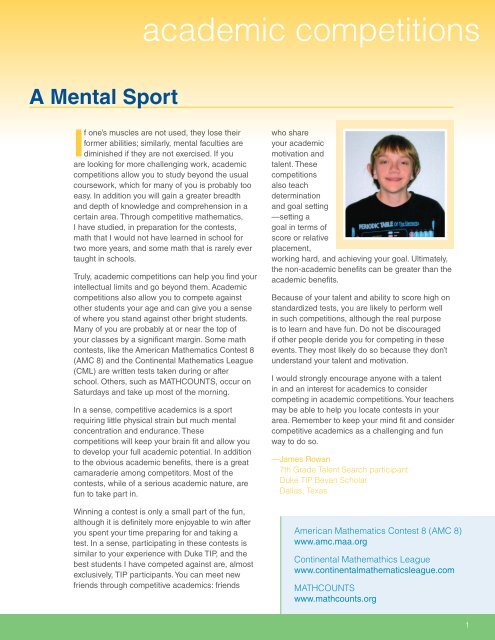You also want an ePaper? Increase the reach of your titles
YUMPU automatically turns print PDFs into web optimized ePapers that Google loves.
academic competitions<br />
A Mental Sport<br />
If one’s muscles are not used, they lose their<br />
former abilities; similarly, mental faculties are<br />
diminished if they are not exercised. If you<br />
are looking for more challenging work, academic<br />
competitions allow you to study beyond the usual<br />
coursework, which for many of you is probably too<br />
easy. In addition you will gain a greater breadth<br />
and depth of knowledge and comprehension in a<br />
certain area. Through competitive mathematics,<br />
I have studied, in preparation for the contests,<br />
math that I would not have learned in school for<br />
two more years, and some math that is rarely ever<br />
taught in schools.<br />
Truly, academic competitions can help you find your<br />
intellectual limits and go beyond them. <strong>Academic</strong><br />
competitions also allow you to compete against<br />
other students your age and can give you a sense<br />
of where you stand against other bright students.<br />
Many of you are probably at or near the top of<br />
your classes by a significant margin. Some math<br />
contests, like the American Mathematics Contest 8<br />
(AMC 8) and the Continental Mathematics League<br />
(CML) are written tests taken during or after<br />
school. Others, such as MATHCOUNTS, occur on<br />
Saturdays and take up most of the morning.<br />
In a sense, competitive academics is a sport<br />
requiring little physical strain but much mental<br />
concentration and endurance. These<br />
competitions will keep your brain fit and allow you<br />
to develop your full academic potential. In addition<br />
to the obvious academic benefits, there is a great<br />
camaraderie among competitors. Most of the<br />
contests, while of a serious academic nature, are<br />
fun to take part in.<br />
Winning a contest is only a small part of the fun,<br />
although it is definitely more enjoyable to win after<br />
you spent your time preparing for and taking a<br />
test. In a sense, participating in these contests is<br />
similar to your experience with Duke TIP, and the<br />
best students I have competed against are, almost<br />
exclusively, TIP participants. You can meet new<br />
friends through competitive academics: friends<br />
who share<br />
your academic<br />
motivation and<br />
talent. These<br />
competitions<br />
also teach<br />
determination<br />
and goal setting<br />
—setting a<br />
goal in terms of<br />
score or relative<br />
placement,<br />
working hard, and achieving your goal. Ultimately,<br />
the non-academic benefits can be greater than the<br />
academic benefits.<br />
Because of your talent and ability to score high on<br />
standardized tests, you are likely to perform well<br />
in such competitions, although the real purpose<br />
is to learn and have fun. Do not be discouraged<br />
if other people deride you for competing in these<br />
events. They most likely do so because they don’t<br />
understand your talent and motivation.<br />
I would strongly encourage anyone with a talent<br />
in and an interest for academics to consider<br />
competing in academic competitions. Your teachers<br />
may be able to help you locate contests in your<br />
area. Remember to keep your mind fit and consider<br />
competitive academics as a challenging and fun<br />
way to do so.<br />
—James Rowan<br />
7th Grade Talent Search participant<br />
Duke TIP Bevan Scholar<br />
Dallas, Texas<br />
American Mathematics Contest 8 (AMC 8)<br />
www.amc.maa.org<br />
Continental Mathemathics League<br />
www.continentalmathematicsleague.com<br />
MATHCOUNTS<br />
www.mathcounts.org<br />
1



